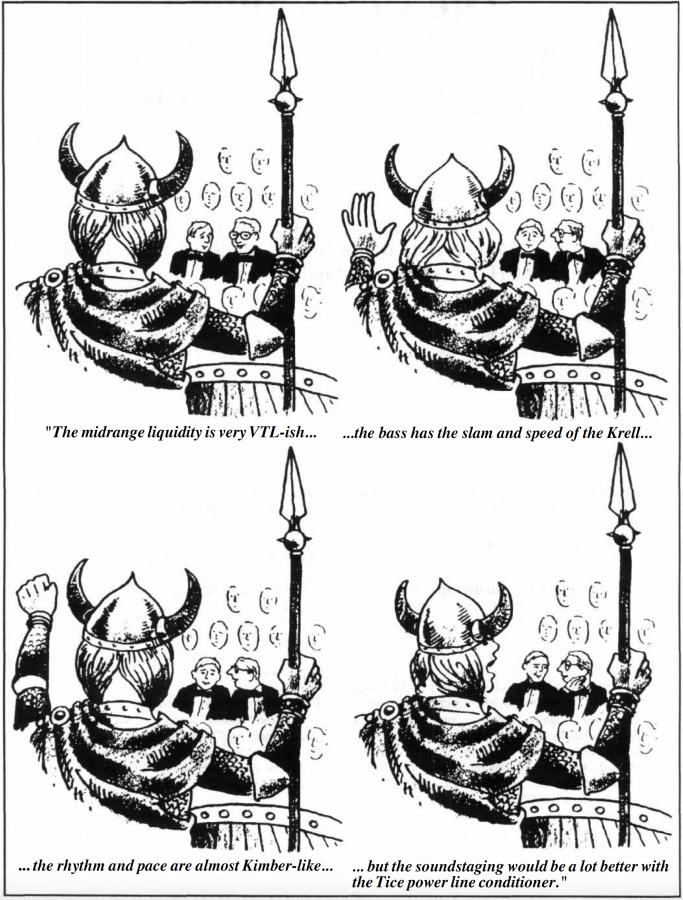1. I don't care if someone else thinks it's hig fidelity or not.
2. I'm not so worried about a recording sounding "live" or not.
3. I'm quite certain that no system "reproduces" that live event because that isn't what stereo recording and playback does or is designed to do.
4. I am just as certain that if any recording and playback system were capable of creating an aural illusion that was absolutely accurate to what one would have heard from a particular seat at a live event that it would not always even be a good thing much less ideal.
5. "Addition" to or "subtraction" from the end result is still a matter of personal preference. One may very well prefer the most "accurate" system but it is still preference
One question I just gotta ask all the folks that are absolutely convinced that any and all distortions of the signal that comes off the master tape will lead to subjectively inferior sound based on the research by Toole and Olive what about cross talk? Added cross talk is a distortion is it not? Is that also always a bad thing in any form after the signal leaves the tape and begins it's journey to our ears? How about compression or dynamic expansion? These are distortions. Are they always bad once the signal starts it's way from the source recording?
Hi ,
So, most of us on this site are not against personal preferences, nor do we have any illusion that stereo can replicate the live event. Speaking for myself, the only reference is the recording itself, whatever levels of distortion, cross talk, etc are on the media, LP or digital, we want to replicate, that's Hi-Fidelity, fidelity to the recording. The issue of course with audio is there is no standard at the recording studio. Whatever speakers, amps, processors, and room and the mix and master engineers idea of what they want you to hear, well that is what is on the recording to the best of their gears ability to record.
So, we can choose to capture all they decided was best for us on our own different gear as closely as possible or we can choose/.adjust our gear to sound good to us, to filter everything through our color of lens.
Perfection in Hi-fidelity recording retrieval would be you reconstructing the studio where they mix and mastered the recording and then your playback system being exactly the same as thiers, that is you take their recording and feed it into their electronics which you by default have replicated, and you sit in the same spot and listen through the same ear/brain interface as the mix/master engineer. Now, no ones ears are the same, so that's where this thing falls apart, we cant replicate the studio in our home, we cant replicate their ear/brain interface, so we each make a personal choice on how we are going to handle that signal coming off the LP or the digital file. Speaking for myself, one schooled in the audio electrical arts, I know that thorough measurments can tell me how close my system is to replicating the signal from the LP or digital file, as IMO in the end, either I try to replicate it (Hi-Fideltiy) with my own gear, or the other option, which I think you are advocating, is to make it sound good.
So, for many of us here, we look to proper suite of measurments to better replicate the LP or digital signal, at that point, we know where we are at, and can either try for more perfect hardware/transducer replication, or add in some tone controls or room correction or whatever, knowing though, why we are doing what we are doing, and this seperates many of us from the crowds of component of the month audiophiles who are following like lemmings the preachings of folks who talk about the absolute sound and all that rubbish.
Everything that is not replicated the same as what is on the recording is distortion. Phase, noise, crosstalk, FR, you name it. Hi-Fidelity in the true meaning of the word, if that is your goal, is simply to replicate everything off of the recording with no distortions added. It is not possible unless you listen at the studio where they made the recording and have the same ear/brain interface. However, the closer you come to replicating the recording, the closer you come to the meaning of the words Hi-Fidelity.
If you play a pure sinewave tone from a test record of say 1Khz, and from say a digital file, you will in many cases prefer the sound of the one from the LP, because it adds distortions that sound better to you. Now, listen to the song from the LP and the same from digital, if the rest of your system is Hi-Fidelity, you will hear more of these differences, and can then choose the recording that you like the best, or the storage medium you like the best, and get all that your choice has to give input into your ears, without added distortions of your playback system. Its kind of that simple I think.
True Hi-Fidelity has nothing to do with the actual live event, it has everything to do with replicating the recording exactly at the input to your ears. Our systems extract info from the recording medium and play it back, either as close to exact or as far away as we choose.
There are two information channels on a stereo recording, one left channel and one right, the goal of Hi-fidelity is for the waveform that is the left channel on the recording is outputted from the left speaker with no change except for perhaps amplitude and the same for the right channel from the recording and the right speaker.
I stand by my tag line below.

